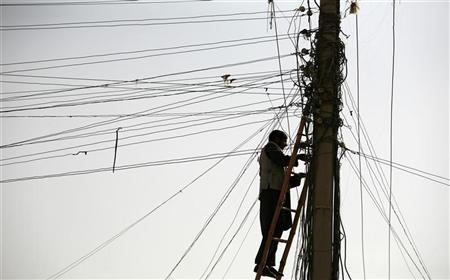By Agnieszka Flak
Only one in three Afghans has access to electricity despite years of spending to improve supply, and the country is still far too dependent on imported power, the head of the country's state owned power utility told Reuters.
Abdul Razique Samadi, the chief executive officer at Da Afghanistan Breshna Sherkat (DABS), said the situation in the capital, Kabul, is far better than the rest of the country, with around 70 percent of households connected.
"Instead of having electricity for two hours, we have power for 24 hours and it is quite reliable," he told Reuters.
About half of India's 1.2 billion people have no access to power and less than a third of sub-Saharan Africa is electrified.
Connecting Afghans to power is key to boosting an economy weakened by decades of war and improving living standards in a country with a poor record on health and education.
Demand in Kabul has tripled over the past five years and is rising each year. Samadi estimates Afghanistan will need around 3,000 megawatts (MW) to meet the country's needs by 2020, compared with current supply of around 600 MW.
But demand is still so modest that his total forecast for 2020 is just 5 percent of what is consumed by the United Kingdom now -- even though Afghanistan's population is already nearly half the size of Britain's.
IMPORT SUPPORT

An Afghan man repairs electricity cables along the streets of Kabul November 16, 2009. (Photo: Reuters/Jerry Lampen)
Power cuts are still a regular feature of life, especially at peak times, with more Afghans wanting to watch TV, use electric radiators or cook on electric stoves.
To meet its shortfall, the country has to rely on expensive, noisy and polluting diesel generators.
Access has improved since a new power line from Uzbekistan began transmitting electricity to Kabul in 2009. Land-locked Afghanistan also sources power from its other neighbors Iran, Turkmenistan and Tajikistan.
More than half of total supply comes from imports and that is unlikely to change in the near term, Samadi said.
Afghanistan's power stations -- mainly hydro plants -- have potential to produce around 500 MW, but actually churn out less than half because of water shortages and maintenance problems.
"For now we are quite vulnerable. We are dependent and here we have a problem," Samadi said.
Imports are also limited by an inadequate transmission network, and even though several projects are planned to strengthen power links, they will take years to complete.
OVERDUE BILLS
Despite millions of dollars of aid poured into the sector over the past 10 years, many big projects that could light up all of Afghanistan still remain on the drawing board, have faced cost overruns or have been delayed due to security concerns.
Afghanistan has the potential to produce up to 23,000 MW from its vast hydro, solar, wind, gas and thermal resources, but much of that remains unexploited due to ongoing conflict.
There is currently around $200 million in donor funds flowing into the sector each year, but Samadi aims to make DABS more independent to negotiate the expected decline in foreign aid as most combat troops pull out by the end of 2014.
The firm, which had turnover of $200 million in 2011, also urgently needs to strengthen its billing system, as it is currently owed around $40 million, mainly by the government.
Samadi downplayed criticism that corruption has hampered revenue collection and the completion of projects.
"Maybe 20 or 30 percent (of the allegations are justified). Still, the government, the donors are doing well," he said.
"This is a very difficult country to work in. Even if it is only a 50 percent success, it's still a success," he said.
(Reporting by Agnieszka Flak; Editing by Sanjeev Miglani)



